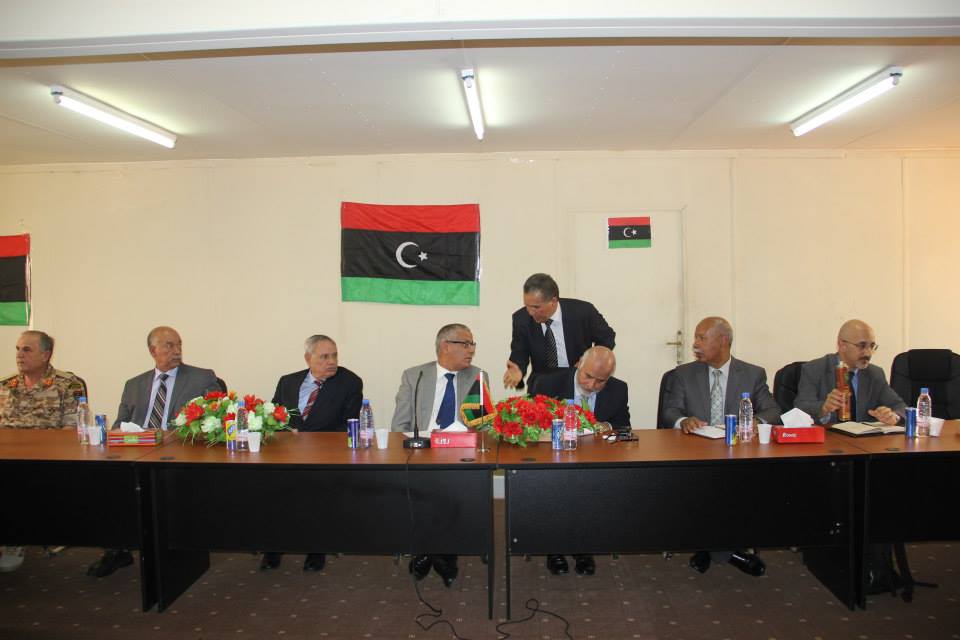By Ahmed Elumami and Michel Cousins.

Tripoli, 3 June 2013:
The Prime Minister Ali Zeidan flew to Kufra today to address security issues . . .[restrict]in the town and in the region. He was accompanied by the new Interior Minister, Mohamed Al-Sheikh, Defense Minister Mohamed Barghathi, Higher Education Minister Mohamed Hasan, Communications Minister Osama Siala, Local Goverment Minister Abubaker Hadi and the Chief of Staff Major General Yousef Mangoush.
According to the Libyan news agency LANA, he met this evening with local Tebu leaders and civil society organisations in a bid to put an end to continuing resentments that are undermining stability in the area.
The visit follows two security summits within the past five days in Tripoli on the deteriorating security situation in the south. The first was on Thursday, attended by the Prime Minister, the Chief of Staff, the Military Governor of the South General Mohamed Al-Thabi as well as the head of intelligence Salem Al-Hassi. The second, an expanded Cabinet meeting yesterday, included Mangoush and Al-Thahbi as well as the head of the Presidential Office in Sebha.
The growing lawlessness in the south as a whole was again seen today when five people were reported killed in heavy fighting between Tebus and members of Al-Shourafa tribe in Zawila, south of Sebha.
On Sunday, an armed group tried to steal half a million dinars from a bank in Obari. The heist failed and some of the gang were arrested but it came just days after thieves stole a reported LD 2 million that was being transferred from the NCB’s regional Sebha headquarters to another branch.
Additionally, there have been four successful jailbreaks from Sebha prison recently, the latest at the end of April, when 170 inmates were reported to have escaped.
Much of the south’s problems are seen as linked to smuggling – mainly of drugs, arms and illegal migrants. Last week, five Libyan border guards were seized near the Sarra military base south of Kufra. Those responsible were reported to be Tebu militiamen involved in cross-border smuggling.
In mid-April, three members of the security forces were killed and four wounded in a dawn attack on Sebha’s main police station, and two weeks earlier two members of the armed forces died and three others were when the Sebha headquarters of southern region military command was attacked. Again, a link with smugglers was suggested, although there were reports of Islamist militants being involved in both attacks.
The increasing claims that Islamist militants from Algeria and Mali have set up bases in the south of the country, supported by Libyan sympathisers, are the development that most worries the international community.
Last week, Nigerean President Mahamadou Issoufou claimed that that the suicide bombers who carried out two attacks in the north of his country had crossed over from Libya. The Algerian authorities made a similar claim following the deadly January attack, thought to be by the same group of militants, on the In Amenas gas facility just across the border from Libya.
Ali Zeidan subsequently denied the Nigerean President’s assertion but France indicated that it believed the reports to be true. President Francois Hollande expressed concerns about lawlessness in southern Libya while French Foreign Minister Laurent Fabius, speaking after meeting with Issoufou, said that a “special effort on southern Libya” might be required.
At yesterday’s security summit, two plans were reportedly agreed to protect the south. The first is enhancing security in the towns of Ghat, Obari, Murzuk, Shatti, Sebha and Kufra. The second is the stepping up of border patrols and aerial reconnaissance to prevent illegal border crossings.
It was also agreed to pay forces stationed in the south salaries of up to LD 1,500 as well as other financial allowances.
There have been difficulties in recruiting forces to serve in the south because of the situation there and the heat.
Among the issues discussed by the Prime Minister today with Tebu leaders in Kufra were infrastructure developments and other financial incentives for the town’s run-down, Tebu-dominated districts of Gadarfai and Shura, which for more than a year have been gated ghettos. On offer are scholarships for Tebu children to study abroad and financial compensation for buildings damaged during the revolution.
Low level clashes and occasional killings between Tebus and Kufra’s majority Arab Zway tribe have continued to destabilize the town. Ali Zeidan called on local residents to renounce violence and concentrate of Kufra’s reconstruction and growth.
[/restrict]








